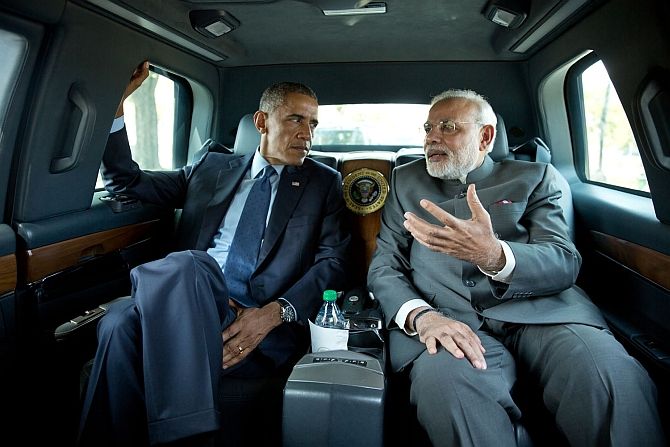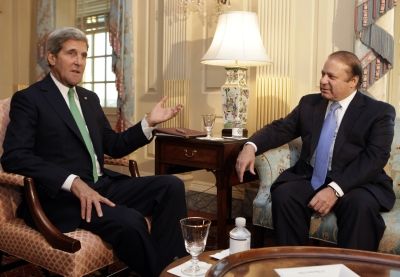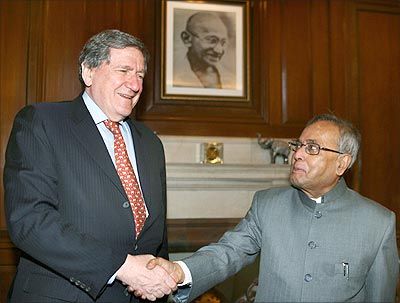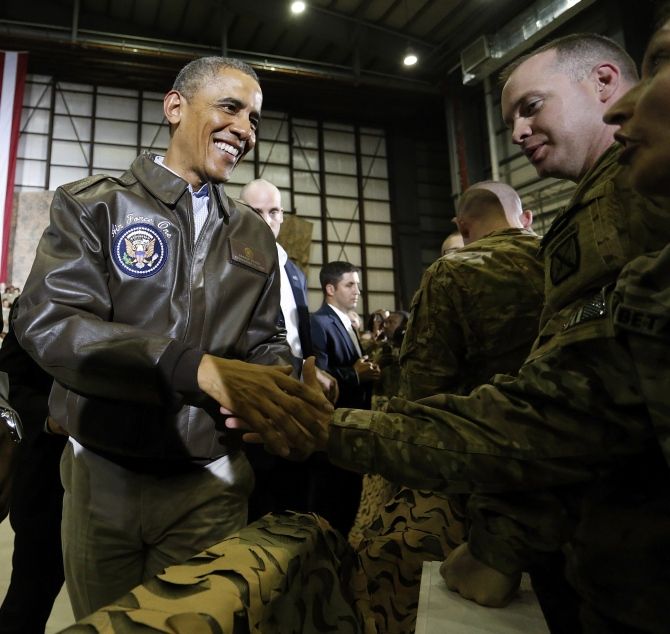'The US-India relationship is in a different league altogether,' Obama administration officials tell Aziz Haniffa/Rediff.com in Washington, DC.

The United States State Department on Monday, February 1, knocked down an Indian newspaper report that the Obama administration is considering a re-merger of the India and Pakistan desks and dismissed the rumour that the office of the Special Representative for Afghanistan and Pakistan would either be scrapped or absorbed into the South Asian and Central Affairs Bureau headed by Assistant Secretary Nisha Desai Biswal.
Both senior administration officials and diplomatic observers, including several erstwhile State Department and National Security Council officials, ridiculed the contention in the report that even if there is such a merger, it would return US policy to a re-hyphenation vis-a-vis India and Pakistan, saying "it went out the door" decades ago with the demise of the Cold War.
At the daily noon briefing, State Department spokesman John Kirby asked if Secretary of State John F Kerry was considering wrapping up the SRAP office, said, "I know of no such plans to do so."
When asked if he would "take the question" meaning if he would check and provide a more detailed or specific answer, Kirby, bristled and said, "No, I am not going to take the question," and reiterated, "I know of no such plans to do so."
When the reporter persisted and asked, if that meant "there is no plan to merge SCA," Kirby shot back, "That's what I just said."
Earlier, senior administration officials had told Rediff.com in response to the question if such a merger was imminent with the SRAP being rolled into the SCA bureau, "We would strongly steer you away from the premise of this report."
They said it was highly unlikely that such a merger would take place with just a year to go in the administration and that the status quo of the two separate bureaus would continue and would "be left to the next administration to make any changes."
They acknowledged that there may have been some thinking on these lines when in July 2014 Kerry formally announced that SRAP, Ambassador Jim Dobbins, would retire and his deputy Dan Feldman would succeed him as the Special Representative.
But the officials told Rediff.com that any such consideration had been nixed when in November Ambassador Richard Olson, who had served in Kabul and most recently as the US envoy to Pakistan, succeeded Feldman and the experience and gravitas he brought to the office in his own low profile way would not warrant any change of either the SRAP office being closed or merged into the SCA.
What the officials and diplomatic observers found particularly irksome in the newspaper report was that if there indeed was such a merger, US policy would re-hyphenated with regard to New Delhi and Islamabad.
The report quoted former foreign secretary and ex-national security adviser Shiv Shankar Menon as saying that 'it looks like the re-hyphenation of the India-Pakistan equation that is not in our interest.'
One official told Rediff.com, "The so-called hyphenation and the perceived zero-sum game went out the door decades ago with the end of the Cold War," and argued that "that's a relic of the past and even if SRAP were to be absorbed into SCA, although there are no such plans, the hyphenation obsession has been long gone -- way before the SRAP office was set up for wholly different reasons and not just to have separate India and Pakistan offices."
According to the official, "It was essentially to devote more attention and resources to the Afghanistan problem and the linkages that involved Pakistan."
"The US-India relationship is in a different league altogether," the official reiterated, "and merger or non-merger, any 're-hyphenation' has absolutely no merit."
Meanwhile, both in a Facebook post and in tweets, and in conversation with Rediff.com, Donald Camp, former principal deputy secretary of state for South Asian Affairs and ex-director of the India/South Asia desk at the National Security Council, described the report as "weird and poorly sourced" and argued that "it is very wrong to suggest, as this does, that a merger -- when and if it occurs -- would in any way be a re-hyphenation."
"Among other errors," Camp said, "it is wrong to say that dealing with India and Pakistan on its own terms, rather than in an 'Indo-Pak format' crystallised only with the formation of SRAP."
"And it is similarly wrong to suggest that a merger of Afghanistan and Pakistan -- when and if it occurs -- back into the SCA bureau is in some way a re-hyphenation of India and Pakistan," Camp added.

Sadanand Dhume, resident scholar and head of the South Asia programme at the neo-conservative American Enterprise Institute, totally agreed with Camp's views and told Rediff.com that there continued to be a deep misunderstanding in New Delhi about "the meaning of de-hyphenation."
"It's about the US abandoning an artificial parity between India and Pakistan, or Washington no longer viewing its ties with India in large part through a Pakistani prism. This took place a decade ago," he said.
"De-hyphenation never meant Washington ending normal diplomatic relations with Islamabad," Dhume argued, "or abandoning the recognition that Pakistan too is a part of South Asia."
Alyssa Ayres, former assistant deputy assistant secretary of state for South Asian Affairs and now a senior fellow at the Council on Foreign Relations, argued that de-hyphenation began long before the creation of SRAP and began in a unified SCA.
The de-hyphenation, she said, had begun in 2005 with the beginnings of the negotiations on the US-India civilian nuclear deal. Camp also argued that the nuclear deal was a tangible example of the death of hyphenation.
But Ayres felt it makes sense to wrap up SRAP and absorb the Pakistan and Afghanistan desks into SCA under a single official and would restore a single assistant secretary level principal for the region.
There are "models within the State Department where a special representative and special envoys who reports to the regional assistant secretary and the various country desks are housed under a regional bureau," Ayres told Rediff.com
"It's also worth noting that the India office has grown very significantly in the last 6, 7 years," Ayres added, "reflecting the up-tempo of bilateral work."
"I believe it was only four people then. Today it is a stand-alone office -- so Nepal, Sri Lanka, and Bangladesh are now a separate office of their own -- and probably has closer to 20 people."
On July 2, 2014, when Kerry announced Dobbins' retirement, Ayres had argued that "this is as good a time as any, given the reduced role of the United States and the changing international presence in Afghanistan today, not to mention in the coming years, to fold the special representative role back into the regional bureau of South and Central Asian Affairs."
"Doing so," she predicted, "will permit better policy coordination within the State Department and across the US government on South and Central Asia in the years to come."
"In previous administrations," Ayres recalled, "Afghanistan and Pakistan had been part of the South and Central Asia bureau. Earlier arrangements for managing US relations with those countries had grouped them with Bangladesh under one office director, with India/Sri Lanka/Nepal handled by a separate office."
"In the 2000s," she added, "with increased US military involvement in Afghanistan, an Afghanistan coordinator role separately handled the uptick in work volume, with Pakistan and Bangladesh still under one office. These offices reported to the assistant secretary of South and Central Asia through the relevant deputies."

In 2009, the Obama administration appointed the hard-charging larger-than-life Ambassador Richard Holbrooke, who had hammered out the Dayton accords to halt the blood-letting in Bosnia, to serve as the first special representative for Afghanistan and Pakistan.
Ayres, while acknowledging that "this arrangement permitted a tightly focused policy push across the US government on Afghanistan and Pakistan," argued, "It also created a parallel bureaucracy alongside the SCA regional bureau, which resulted in communication and coordination gaps by virtue of that institutional separation."
"Parallel bureaucracies," she said, "don't facilitate ease of policy coordination," and added, "A seamless overview of US relations throughout the SCA region, and the impact of the coming drawdown in Afghanistan, would be far easier to accomplish if our focused diplomacy towards Afghanistan and Pakistan was embedded within the South and Central Asia bureau."
Former US ambassador Teresita C Schaffer, and ex-deputy assistant secretary of state for Near Eastern and South Asian Affairs at a time a separate South Asia bureau didn't exist, responding to reports of a merger between the office of the Special Representative for Afghanistan and Pakistan and the South Asian and Central Affairs bureau, and more so the controversy that such a merger would result in a return to the hyphenation of US policy toward India and Pakistan said, "The short answer is that the report had put two and two together and got about 16."
Schaffer, who has over 30 years experience in and on South Asia and writes the popular South Asia Hand blog with her husband, Howard Schaffer, also a former diplomat with decades of service in the subcontinent, told Rediff.com, "US policy is still 'de-hyphenation' -- trying to manage the important and very different relationships with India and Pakistan without making one dependent on the other."
"In my long years in the State Department, I found that the biggest hyphenators were not in Washington, but in Islamabad and Delhi," she said, and argued that policy should not be confused with organisation.
"The State Department's geographic organisation basically groups together countries that are close geographically," Schaffer explained. "India and Pakistan have always been in the same geographic bureau. From Partition till 1995, it was Near East and South Asia, and after that, thanks to (former Democratic Congressman) Steve Solarz (who chaired the House Foreign Affairs Subcommittee on Asia and the Pacific that had jurisdiction over South Asia), both were shifted, along with Afghanistan/Bangladesh/Sri Lanka/Nepal/Maldives/Bhutan, to the Bureau of South Asian Affairs."
"This did not reflect a new policy -- it reflected Steve Solarz's persistence and his personal pique that the assistant secretary rarely paid much attention to him as long as South Asia was under the same person as the Near East," she said.

"This was seen in Delhi as a 'pro-India' move. I thought that was wrong at the time. A few years later, Central Asia was added to the bureau basically because the European Bureau had become too big for one assistant secretary to manage. Again, that didn't make any difference to India policy."
"The creation of SRAP in 2009 was the creation of Hillary Clinton and Richard Holbrooke, and was intended to provide more focused attention to Afghanistan and Pakistan -- not India," Schaffer said
"This was happening at a time when the US had military forces in Afghanistan and the military side of things was working closely with -- and traveling constantly through -- Pakistan. Technically, both Afghanistan and Pakistan were part of the South/Central Asia bureau, but in practical terms responsibility shifted to SRAP. SRAP grew enormously in numbers of staff -- the South Asia Bureau also grew, but nowhere near as much."
"The plan had always been to close down this rather unnatural arrangement as soon as the US troops left Afghanistan," Schaffer noted. "Kerry didn't have the same 'pride of authorship' for this arrangement as Clinton, and in any case none of Holbrooke's successors as SRAP had the same high profile."
"The troops' presence was extended. So was SRAP. The administration perhaps didn't have the appetite for the work that goes into undoing an organisational set-up that has by now been in place for seven years."
"So what's happened to policy?" Schaffer asked. "US relations with Pakistan have been through a terrible time, from which they are barely recovering even though the SRAP arrangement was supposed to give Pakistan more high level attention."
Meanwhile, "US relations with India continued to grow in spite of the thaw with Pakistan after 9/11," Schaffer pointed out. "We have had an unprecedented number of summits especially in the past two years. We also had some serious speed bumps."
Thus, she argued, "The only reasonable conclusion is that policy has not been driven by organisation but by things that happened out there in the real world. If State closes down the SRAP operation, it would probably improve policy coordination but wouldn't change the policy thrust that has benefited US-India relations."
"Only one organization in the US government has specifically put India and Pakistan in different pigeonholes -- the US military," Schaffer added. "The regional command that maintains a relationship with India is the Pacific Command in Honolulu, covering Asia from India eastward -- and the one that maintains ties with Pakistan is Central Command in Tampa, Florida, covering the Middle East and the Gulf.";]
"I'm not sure when this change took place," she said, "but it was certainly before the 1970s when I first went out to Pakistan, and the purpose was to give both the Indian and the Pakistani militaries a close link to a senior US military commander who is not responsible for the other."
"The rest of the government has not adopted this set-up," Schaffer noted. "Many people feel that this split organisation led both commanders to have a somewhat skewed perspective on the region."
"Some people were fooled by de-hyphenation and thought that the US had either abandoned Pakistan or had put India ahead of Pakistan," Stephen Cohen, Senior Fellow at The Brookings Institution, who is considered the doyen of South Asian experts in Washington, DC, told Rediff.com, "but we have strong interests in 'normal' -- that is no war -- India-Pakistan relations, in the disposition of nuclear weapons, and in India's and Pakistan's prosperity."
"De-hyphenation made it possible to appear to be treating the two separately and was a good idea,"Cohen said, "but they remain joined at the hip."
"Historically, it was the Mughal empire that created 'Hindoostan,' then the British East India Company took it over, and tragically both India and Pakistan believe that they are each the legatee," Cohen said.
"(Field Marshal Sir Claude 'The Auk') Auchinleck told me, when I interviewed him 50 years ago, that the division between the two was South Asia's greatest tragedy and Britain's greatest failure, we are all living with this catastrophe now."
"Changing labels will not change fundamental US interests," Cohen asserted and added, "One of these is the peaceful evolution of a 'normal' Pakistan."
"This perhaps is the most important strategic interest that the US and India now have in common," Cohen said, "as many Indians now understand."











 © 2025
© 2025